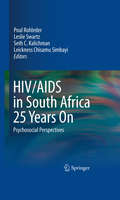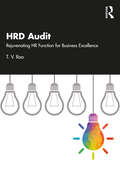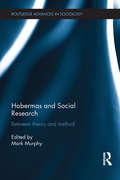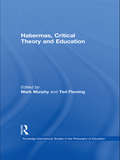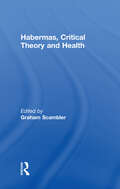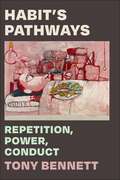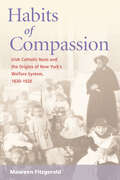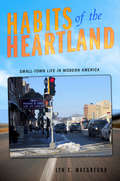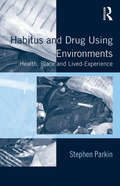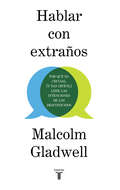- Table View
- List View
HIV/AIDS in South Africa 25 Years On
by Leslie Swartz Seth C. Kalichman Poul Rohleder E. Cameron Leickness Chisamu SimbayiMuch has happened since the first appearance of AIDS in 1981: it has been identified, studied, and occasionally denied. The virus has shifted host populations and spread globally. Medicine, the social sciences, and world governments have joined forces to combat and prevent the disease. And South Africa has emerged as ground zero for the pandemic. The editors of HIV/AIDS in South Africa 25 Years On present the South African crisis as a template for addressing the myriad issues surrounding the epidemic worldwide, as the book brings together a widely scattered body of literature, analyzes psychosocial and sexual aspects contributing to HIV transmission and prevention, and delves into complex intersections of race, gender, class, and politics. Including largely overlooked populations and issues (e.g., prisoners, persons with disabilities, stigma), as well as challenges shaping future research and policy, the contributors approach their topics with rare depth, meticulous research, carefully drawn conclusions, and profound compassion. Among the topics covered: The relationship between HIV and poverty, starting from the question, "Which is the determinant and which is the consequence?"Epidemiology of HIV among women and men: concepts of femininity and masculinity, and gender inequities as they affect HIV risk; gender-specific prevention and intervention strategies. The impact of AIDS on infants and young children: risk and protective factors; care of children by HIV-positive mothers; HIV-infected children.Current prevention and treatment projects, including local-level responses, community-based work, and VCT (voluntary counseling and testing) programs.New directions: promoting circumcision, vaccine trials, "positive prevention."South Africa's history of AIDS denialism.The urgent lessons in this book apply both globally and locally, making HIV/AIDS in South Africa 25 Years On uniquely instructive and useful for professionals working in HIV/AIDS and global public health.
HIV/AIDS: Global Frontiers In Prevention/intervention
by Cynthia Pope Renee T. White Robert MalowHIV/AIDS: Global Frontiers in Prevention/Intervention provides a comprehensive overview of the global HIV/AIDS epidemic. The unique anthology addresses cutting-edge issues in HIV/AIDS research, policymaking, and advocacy. Key features include: · Nine original essays from leading scholars in public health, epidemiology, and social and behavioral sciences · Comprehensive information for individuals with varying degrees of knowledge, particularly regarding methodological and theoretical perspectives · A look into the future progression of HIV transmission and scholarly research HIV/AIDS: Global Frontiers in Prevention/Intervention is will serve as a precious resource as a textbook and reference for the university classroom, libraries, and researchers
HR Like a Boss: Your Guide to Amazingly Awesome HR
by John BernatoviczHR Like a Boss offers HR professionals all the tools they need to help employees feel more connected to their organization and ensure the organization's success. This book empowers HR professionals to become bold, business-savvy leaders who inspire connection and drive results. Written by a creative entrepreneur dedicated to the HR community, the book blends compelling stories of real practitioners who embody the characteristics of a "boss" - meaning a skilled business leader - with actionable insights to help readers elevate their impact. With a focus on building trust, fostering engagement, and aligning HR with business success, it shows how to lead with heart and strategy at once. A must-read for HR professionals who want to make a difference for their people, organizations, and communities.
HR Unleashed!!: Developing the Differences That Make a Difference
by Steve BrowneGreat HR is about more than policies - it's about people, purpose, and positive impact. In HR Unleashed!!, bestselling author Steve Browne shares heartfelt personal and professional stories that inspire HR professionals to embrace their calling and do their best work. With the same energy and authenticity found in HR on Purpose!! and HR Rising!!, the author encourages readers to pursue excellence while making a real difference in the lives of employees, the success of organizations, and the betterment of the workplace as a whole.This book is both a challenge and a celebration - a reminder that when HR leads with intention, it can change the world.
HR on Purpose: Developing Deliberate People Passion
by Steve BrowneCan you still be excited about HR after 30 years in the field? Absolutely - if you lead with purpose. In HR on Purpose, Steve Browne - seasoned HR leader and popular "Everyday People" blogger - invites readers to rethink what HR is and reimagine what it could be. Through a series of engaging stories, personal reflections and practical takeaways, he shows how to embrace HR not just as a profession but as a calling. With honesty, humor and inspiration, Browne helps HR professionals reconnect with the meaning and impact of their work.Perfect for anyone at any stage of their HR career, this book is a daily reminder that HR is about people, and it can be joyful, bold and transformational.
HRD Audit: Rejuvenating HR Function for Business Excellence
by T. V. RaoThis book presents the first ever comprehensive approach to evaluating and redesigning Human Resource Development (HRD) function and intervention to maximise their contribution to business excellence.The HRD function recognises the significance of competent and committed people in helping organizations achieve excellence. Studies across the globe have indicated that good HR systems and practices go a long way to make firms effective. Competent employees, top management, HR staff and the HRD climate play a critical role. This book examines how users of HRD are partners in any review and evaluation. It uses multiple methods like interviews with stakeholders, observation, questionnaires, analysis of documents and workshops. The book also outlines key HRD audit methodologies to review and rejuvenate HRD and align it with business excellence including intellectual capital building for the long term.An incisive and invigorating read, this book would be useful to the students, researchers, line managers, CEOs, CXOs and faculty of Human Resource Management, Organizational Behaviour and Applied Psychology. It would also be an invaluable handbook for practising business executives to help them implement the performance management and other talent management systems for leading excellence.
HRD and Learning Organisations in Europe
by Jim Stewart Martin Mulder Sally Sambrook Saskia Tjepkema Hilde Ter Horst'Lifelong learning' is moving from buzzword to reality for ever latger numbers of workers. Firms increasingly need their workers to be active, self-directed learners who contribute to innovations and improvements of processes, products and services. Companies that explicitly encourage and support worker learning, from a strategic perspective, are c
HTO: Toronto's Water from Lake Iroquois to Lost Rivers and Low-flow Toilets (uTOpia)
by Wayne Reeves Christina PalassioDrained by a half-dozen major watersheds, cut by a network of deep ravines and fronting on a Great Lake, Toronto is dominated by water. Like most cities, though, Toronto has mismanaged its water, from the decades-long transformation of the citys creeks into sewersheds to the alteration of Torontos waterfront. Recently, the trend of fettering Torontos water and putting it underground has been countered by persistent citizen-led efforts to recall and restore the citys surface water. In HTO: Toronto's Water From Lake Iroquois to Lost Rivers to Low-flow Toilets, 30 contributors examine the ever-changing interplay between nature and culture, and call into question the citys past, present and future engagement with water.
HaWoS – Fragebogen zur Erfassung von Glück bei der Arbeit: Manual (Manuale zu Testverfahren und Fragebögen)
by Ricarda Rehwaldt Timo KortschDie HappinessandWork-Scale (HaWoS) ist ein Verfahren, das Bedingungen für Glück bei der Arbeit erfasst. Es handelt sich um ein mehrdimensionales Instrument der Organisationsdiagnostik, das als Ausgangspunkt einer Förderung von Glück im Arbeitskontext dient. Die HAWOS misst das Glücksempfinden der Mitarbeitenden einer Organisation im Arbeitskontext über zwölf Items anhand der drei Faktoren des Arbeitsglücks: Sinnempfinden, Selbstverwirklichung und Gemeinschaftsgefühl. Die Items der HAWOS sind berufsbezogen formuliert, die Entwicklungs- und Validierungsstudien wurden an Personen mit Berufserfahrung durchgeführt. Hintergrund: Für Beschäftigte gewinnt eine erfüllende Arbeit immer mehr an Bedeutung. Die HaWoS setzt mit der Erfassung von glücksförderlichen Bedingungen bei der Arbeit genau dort an. Mit dem validierten HaWoS können Ansatzpunkte für die Gestaltung der Arbeit identifiziert werden und Interventionen evaluiert werden. Die Zielgruppen: Arbeits-, Wirtschafts- und Organisationspsycholog*innen Personalentwickler*innen Personalverantwortliche, Management, Führungskräfte Coaches Organisationsberater*innen EinsatzbereicheDie HaWoS kann im Individual- und im Gruppenkontext angewendet werden. Die HaWoS bildet dabei den Ausgangspunkt für Interventionen oder Entwicklungsprozesse mit dem Ziel einer glücksförderlicheren Arbeitsgestaltung. Die HaWoS kann außerdem in Transformationsprozessen eingesetzt werden, die einen Kulturwandel zu einer sinnhafteren Arbeit zum Ziel haben.Durchführung, Auswertung und Interpretation· Sehr gute Testökonomie: Bearbeitungszeit von max. 5 Minuten· Testdurchführungen erfolgt digital oder „paper-pencil“· Online-Auswertung direkt im Testsystem mit grafischen Ergebnissen auf einem intuitiv nutzbaren Dashboard Gütekriterien· Objektivität ist durch standardisierte Durchführung und Auswertung gewährleistet.· Reliabilität: Mit Werten zwischen = .77 und = .86 im guten Bereich.· Validität: Bestätigung der faktoriellen sowie der konvergenten Validität in mehreren Studien.· Normierung basierend auf einer Normstichprobe von 3353 Personen liegt vor.
Habermas and Social Research: Between Theory and Method (Routledge Advances in Sociology)
by Mark MurphyOne of the greatest contributors to the field of Sociology, Jürgen Habermas has had a wide-ranging and significant impact on understandings of social change and social conflict. He has inspired researchers in a range of disciplines with his multidimensional social theory, however an overview of his theory in applied settings is long overdue. This collection brings together in one convenient volume a set of researchers who place Jürgen Habermas’ key concepts such as colonisation, deliberation and communication at the centre of their research methodologies. Full of insight and innovation, this book is an essential read for those who want to harness the potential of Habermas’ core concepts in their own work, thereby helping to bridge the gap between theory and method in social research. Structured around three core themes, Habermas and Social Research provides a range of research case studies looking at system colonization, the politics of deliberation and communicative interactions. Issues as diverse as social movements, the digital public sphere, patient involvement, migration and preschool education, are all covered in the book, intertwined with a set of innovative approaches to theory application in social research. Designed to help researchers harness the potential of Habermas’ core concepts as methodological tools, this timely volume will prove highly useful for graduate and upper level undergraduates within the fields of theory and method, research design, public policy, education policy, urban and environmental planning.
Habermas between Critical Theory and Liberalism
by Kire SharlamanovThis book identifies the turning points in Habermas's work and his transition from one stage to another in the development of his theoretical oeuvre. Habermas began his academic career as part of the Frankfurt School, but the two key points at which his career changes trajectory are moving from historical materialism to normative idealism and playing with some of the ideas of liberalism. Normative idealism is an ahistorical theory that insists on the independence of the normative from material reality, severing the connection between base and superstructure that Marx wrote about. The break with the basic concepts of Marxism enabled Habermas to build his own discursive (critical) theory, which, especially since the end of the 1980s, takes the ideas of liberalism seriously. This book makes a systematic, multidimensional and detailed analysis of Habermas's theoretical oeuvre in two dimensions, chronological (in the order in which Habermas worked on certain topics) and thematic (enclosingcertain thematic units).
Habermas, Critical Theory and Education (Routledge International Studies in the Philosophy of Education)
by Mark Murphy Ted FlemingThe sociologist and philosopher Jürgen Habermas has had a wide-ranging and significant impact on understandings of social change and social conflict. However, there has been no concerted and focused attempt to introduce his ideas to the field of education broadly. This book rectifies this omission and delivers a definitive contribution to the understanding of Habermas's oeuvre as it applies to the field. The authors examine the contribution Habermas's theory has and can make to: pedagogy, learning and classroom interaction; the relation between education, civil society and the state; forms of democracy, reason and critical thinking; and performativity, audit cultures and accountability. Additionally, the book answers a range of more specific questions, including: what are the implications for pedagogy of a shift from a philosophy of consciousness to a philosophy of language?; What contribution can Habermas's re-shaping of speech act theory and communicative rationality make to theories of classroom interaction?; and how can his theories of reason and colonization be used to explore questions of governance and accountability in education?
Habermas, Critical Theory and Health
by Graham ScamblerThe contribution of the German sociologist and philosopher Jurgen Habermas has proved seminal for attempts to understand the nature of social change in the context of global capitalism. This book provides an accessible introduction to his work and shows how his theories can be fruitfully applied to a wide range of topics in the sociology of health and illness including: * lay health knowledge * doctor-patient interaction* health care decision-making * health inequalities * new social movements in health * health care rationing * the Foucault perspective. Habermas, Critical Theory and Health will open up both new issues and new lines of empirical enquiry which will be of special interest to teachers and students of social theory and the sociology of health and illness and offers healthcare professionals new perspectives on their practice.
Habermas, Foucault and the Political-Legal Discussions in China: A Discourse on Law and Democracy
by Fan YangThis book revisits the discourse theories of Habermas and Foucault in a Chinese context. After arguing that Habermas’s Discourse Theory of Law and Democracy is too normative and idealistic, it presents Foucault’s Discourse Theory of Power Relations to illustrate the tensions between different Western discourse theories. The book then draws on the normative concept of Confucian Rationality from traditional Chinese cultural sources in order to investigate how adaptable these two discourse theories are to the Chinese society, and to balance the tension between them. Presenting these three dimensions of discourse theory, as well as the relations between them, it also uses empirical descriptions of certain facts of political-legal discussion both in traditional China and in the country’s new media age to explain, supplement and question this theoretic framework.The book asserts that, because of the diverse modes of thinking in specific cultures, there might be different normative paradigms of discorse and different political-legal discussion modes across corresponding cultural contexts. Normative discourse theories provide guidance for the practices of deliberative democracy and legal discussions, which can in turn verify, supplement, improve and challenge the normative discourse theories. In addition to demonstrating the multiple dimensions of discourse theories, this research also promotes an approach to the Discourse Theory of Law and Democracy that combines elements of both Chinese and modern society.
Habermas: Rescuing the Public Sphere (Routledge Studies in Social and Political Thought #Vol. 46)
by Pauline JohnsonIf we are to believe what many sociologists are telling us, the public sphere is in a near terminal state. Our ability to build solidarities with strangers and to agree on the general significance of needs and problems seems to be collapsing. These cultural potentials appear endangered by a newly aggressive attempt to universalize and extend the norms of the market. For four decades Habermas has been trying to bring the claims of a modern public sphere before us. His vast oeuvre has investigated its historical, sociological and theoretical preconditions, has explored its relevance and meaning as well as diagnosing its on-going crises. In the contemporary climate, a systematic look at Habermas’ lifelong project of rescuing the modern public sphere seems an urgent task. This study reconstructs major developments in Habermas’ thinking about the public sphere, and is a contribution to the current vigorous debate over its plight. It marshals the significance of Habermas’ lifetime of work on this topic to illuminate what is at stake in a contemporary interest in rescuing an embattled modern public sphere. Habermas’ project of rescuing the neglected potentials of Enlightenment legacies has been deeply controversial. For many, it is too lacking in radical commitments to warrant its claim to a contemporary place within a critical theory tradition. Against this developing consensus, Pauline Johnson describes Habermas’ project as one that is still informed by utopian energies, even though his own construction of emancipatory hopes itself proves to be too narrow and one-sided.
Habermas: The Key Concepts (Routledge Key Guides)
by Andrew EdgarAn independently minded champion of ‘the project of modernity’ in a supposedly post-modern age, Jurgen Habermas (1929- ) is one of the most widely influential thinkers of our times. An easy-to-use A-Z guide to a body of work that spans philosophy, sociology, politics, law and cultural theory, Habermas: The Key Concepts explores Habermas’ writings on: capitalism genetics law neo-conservatism universal pragmatics. Fully cross-referenced with extensive suggestions for further reading, this is an essential reference guide to one of the most important social theorists of the last century.
Habit's Pathways: Repetition, Power, Conduct
by Tony BennettHabit has long preoccupied a wide range of theologians, philosophers, sociologists, psychologists, and neuroscientists. In Habit’s Pathways Tony Bennett explores the political consequences of the varied ways in which habit’s repetitions have been acted on to guide or direct conduct. Bennett considers habit’s uses and effects across the monastic regimens of medieval Europe, in plantation slavery and the factory system, through colonial forms of rule, and within a range of medicalized pathologies. He brings these episodes in habit’s political histories to bear on contemporary debates ranging from its role in relation to the politics of white supremacy to the digital harvesting of habits in practices of algorithmic governance. Throughout, Bennett tracks how habit’s repetitions have been articulated differently across divisions of class, race, and gender, demonstrating that although habit serves as an apparatus for achieving success, self-fulfillment, and freedom for the powerful, it has simultaneously served as a means of control over women, racialized peoples, and subordinate classes.
Habitable Future: Smart Spaces, Objects, and Devices to Support Aging (SpringerBriefs in Applied Sciences and Technology)
by Marco Sacco Tiziana FerranteThis open-access book presents a multidisciplinary approach to the design of living spaces from an age-friendly perspective, in line with the Ambient Assisted Living (AAL) paradigm, which promotes the integration of assistive devices and technologies to create safe, comfortable environments that meet the needs of older adults and their caregivers. It outlines new operational strategies, incorporating an analysis of technological development trends focused on the well-being and health of older adults, identifying their needs and expectations through participatory processes, and establishing design requirements to foster the acceptance of interfaces and emerging devices. In light of the exponential increase in smart applications within living environments, the book emphasizes the necessity to introduce cutting-edge solutions for data transmission and processing, as well as the development of semantically driven tools to support designers in selecting and integrating assistive technologies through virtual environment simulations. The book also illustrates the methodological processes adopted in defining guidelines for the design of spaces dedicated to older adults, with attention to architectural and functional aspects in various domains: perceptual and sensory factors for the design of waiting areas in Community Houses, technological and environmental requirements for the integration of devices in home adaptation projects for Home Care and locational and typological criteria for the development of new Social Day Care Centers. These contributions are based on the experiences shared during the conference organized by the WP1 "Human-Centred Design and Evaluation, Certifications, Sustainability within the Built Environment" of Spoke9, within the framework of the Age-It/NRRP program.
Habits of Compassion: Irish Catholic Nuns and the Origins of New York's Welfare System, 1830-1920 (Women, Gender, and Sexuality in American History)
by Maureen FitzgeraldThe Irish-Catholic Sisters accomplished tremendously successful work in founding charitable organizations in New York City from the Irish famine through the early twentieth century. Maureen Fitzgerald argues that their championing of the rights of the poor—especially poor women—resulted in an explosion of state-supported services and programs. Parting from Protestant belief in meager and means-tested aid, Irish Catholic nuns argued for an approach based on compassion for the poor. Fitzgerald positions the nuns' activism as resistance to Protestantism's cultural hegemony. As she shows, Roman Catholic nuns offered strong and unequivocal moral leadership in condemning those who punished the poor for their poverty and unmarried women for sexual transgression. Fitzgerald also delves into the nuns' own communities, from the class-based hierarchies within the convents to the political power they wielded within the city. That power, amplified by an alliance with the local Irish Catholic political machine, allowed the women to expand public charities in the city on an unprecedented scale.
Habits of the Heartland: Small-Town Life in Modern America
by Lyn C. Macgregor"So, how do Americans in a small town make community today? This book argues that there is more than one answer, and that despite the continued importance of small-town stuff traditionally associated with face-to-face communities, it makes no sense to think that contemporary technological, economic, and cultural shifts have had no impact on the ways Americans practice community life. Instead, I found that different Viroquans took different approaches to making community that reflected different confluences of moral logics--their senses of obligation to themselves, to their families, to Viroqua, and to the world beyond it, and about the importance of exercising personal agency. The biggest surprise was that these ideas about obligation and agency, and specifically about the degree to which it was necessary or good to try to bring one's life into precise conformance with a set of larger goals, turned out to have replaced more traditional markers of social belonging like occupation and ethnicity, in separating Viroquans into social groups. "--from Habits of the Heartland Although most Americans no longer live in small towns, images of small-town life, and particularly of the mutual support and neighborliness to be found in such places, remain powerful in our culture. In Habits of the Heartland, Lyn C. Macgregor investigates how the residents of Viroqua, Wisconsin, population 4,355, create a small-town community together. Macgregor lived in Viroqua for nearly two years. During that time she gathered data in public places, attended meetings, volunteered for civic organizations, talked to residents in their workplaces and homes, and worked as a bartender at the local American Legion post. Viroqua has all the outward hallmarks of the idealized American town; the kind of place where local merchants still occupy the shops on Main Street and everyone knows everyone else. On closer examination, one finds that the town contains three largely separate social groups: Alternatives, Main Streeters, and Regulars. These categories are not based on race or ethnic origins. Rather, social distinctions in Viroqua are based ultimately on residents' ideas about what a community is and why it matters. These ideas both reflect and shape their choices as consumers, whether at the grocery store, as parents of school-age children, or in the voting booth. Living with--and listening to--the town's residents taught Macgregor that while traditional ideas about "community," especially as it was connected with living in a small town, still provided an important organizing logic for peoples' lives, there were a variety of ways to understand and create community.
Habitus and Drug Using Environments: Health, Place and Lived-Experience
by Stephen ParkinInformed by the thought of Pierre Bourdieu and framed by the philosophy of harm reduction, Habitus and Drug Using Environments provides a sociological analysis of public environments affected by injecting drug use. Drawing on ethnographic research across several locations, this book offers a qualitative and phenomenological account of the social organisation of public settings used for the preparation and administration of illicit drugs, informed by interviews with both injecting drug users and those whose employment is directly affected by public injecting drug use. With attention to current policy-related questions concerning the lived experience of ’place’ upon the health of injecting drug users, how wider social structures contribute to participation in public injecting and the manner in which participation in public injecting amplifies drug-related harm, Habitus and Drug Using Environments sheds light on the ways in which health and place interact to produce and reproduce already established hazards associated with injecting drug use. As such, it will be of interest to sociologists, geographers, criminologists and policy makers working in fields such as drug use, risk behaviours and their relation to place, and health studies.
Habitus, Ressourcen und Studienstrukturen: Passungen und Nicht-Passungen im Fachhochschulstudium
by Sabine EvertzWie erleben Studierende ihr Studium und wie hängt dieses Erleben mit ihren Habitusmustern und Ressourcenausstattungen zusammen? Die soziologische Studie widmet sich aus ungleichheitstheoretischer Perspektive den Passungen und Nicht-Passungen im Fachhochschulstudium. Ergründet wurden Konstellationen von Habitusmustern, Ressourcenausstattungen und Studienstrukturen. Bei den Studienstrukturen handelt es sich unter anderem um studienorganisatorische Strukturen wie die Stundenplangestaltung, um unmittelbar auf die Lehre bezogene Strukturen wie Lehrmethoden und Prüfungsformen oder auch um Strukturen, die im Besonderen das soziale Miteinander betreffen wie die Studienatmosphäre. Die Ergebnisse basieren auf der Analyse von Leitfadeninterviews mit Studierenden der Studienfächer Soziale Arbeit und Maschinenbau sowie auf der Auswertung von Wochenbüchern, die Erstsemesterstudierende in der Studieneingangsphase verfasst haben.
Hablar con extraños: Por qué es crucial (y tan difícil) leer las interacciones de los desconocidos
by Malcolm GladwellVUELVE EL MEJOR GLADWELL, autor de El punto clave, Inteligencia intuitiva y Fuera de serie. «Si puedo convencerte de una única cosa con este libro, que sea esta: los desconocidos no son simples.» ¿Cómo pudo un espía pasar años sin ser detectado en los más altos niveles del Pentágono? ¿Qué llevó a Neville Chamberlain a creer que podía confiar en Adolf Hitler? ¿Qué tienen en común esos casos con el engaño de Bernie Madoff, el juicio de Amanda Knox, el suicidio de Sylvia Plath o la comedia de televisión Friends? Cuando interactuamos con desconocidos, a menudo las cosas no salen bien, en parte porque creemos adivinar las intenciones de los demás basándonos en pistas terriblemente endebles. En Hablar con extraños, Malcolm Gladwell, el autor que ha conquistado a una legión de admiradores con su particular manera de ver el mundo, entrevista a toda una serie de personas brillantes, ofrece un arsenal de ejemplos divertidos, contraintuitivos y convincentes, extrae de ellos ideas poderosas y las condimenta con abundantes datos inolvidables. Al mostrarnos por qué se nos da tan mal leer entre líneas, revela las claves para lidiar mejor con los desconocidos en nuestra vida. En este nuevo viaje a lo inesperado, Gladwell nos ofrece nuevos y valiosos descubrimientos sobre nosotros mismos, pasados por el prisma de la historia, la psicología y la sociología. La crítica ha dicho:«Excelente escritura, estructura magistral, datos llamativos elegantemente reutilizados. La fórmula que hizo que sus libros anteriores fueran éxitos.»Financial Times «Irresistible, y dará que hablar. En un momento de máxima polarización, un libro que examina el modo en que fallamos a la hora de comunicarnos no podría ser más oportuno. Se devora como si fuera un thriller.»Chris Barton, Los Angeles Times «Hay un momento de la lectura en el que incluso el escéptico comienza a sentir que nos estamos equivocando en todo y que quizá este tal Gladwell ha dado con algo... Hablar con extraños es el más sólido de sus títulos.»Amy Chozick, The New York Times «Gladwell ofrece poderosos consejos para entender mejor a los otros. Defiende brillantemente que nadie es transparente y la necesidad de comprender que los comportamientos dependen de circunstancias invisibles.»People «Los casos que analiza Galdwell son sensacionales. Repleto de fascinantes anécdotas, de las cuales extrae pequeñas píldoras sobre cómo relacionarnos con los desconocidos.»Maggie Taft, Booklist «Intelectualmente estimulante, otro tour de force de Gladwell. Los lectores que esperen una nueva lectura adictiva del tipo "nada-de-lo-que-dabas-por-sentado-es-así" no se verán defraudados.»Kirkus Reviews «Fascinante yoportuno. Gladwell escribe con su característica prosa colorida, fluida y accesible.»Publishers Weekly «Adoro este libro. No solo cambia el modo en que vemos a los extraños, sino también cómo entendemos las noticias, el mundo y a nosotros mismos. Transformador.»Oprah Winfrey «Uno de los mejores observadores de su generación, un pensador de amplio espectro que nos ayuda a comprender la condición humana.»Bob Brisco, WebMD Magazine «Gladwell tiene un inmenso talento: una mente aguda, original e inquisitiva, la capacidad de desenterrar información que otros no han considerado y darle un sentido más amplio. Su habilidad narrativa es inigualable.»Stephen Galloway, The Hollywood Reporter
Hack: How I Stopped Worrying About What to Do with My Life and Started Driving a Yellow Cab
by Melissa PlautIn her late 20s, Plaut decided to honor a long-held secret ambition by becoming a New York City taxi driver. With wit and insight, she recreates the crazy parade of humanity that passes through her cab and shows how this grueling work provides her with a greater sense of self.
Hack: Stories from a Chicago Cab (Chicago Visions And Revisions Ser.)
by Dmitry SamarovCabdrivers and their yellow taxis are as much a part of the cityscape as the high-rise buildings and the subway. We hail them without thought after a wearying day at the office or an exuberant night on the town. And, undoubtedly, taxi drivers have stories to tell—of farcical local politics, of colorful passengers, of changing neighborhoods and clandestine shortcuts. No one knows a city’s streets—and thus its heart—better than its cabdrivers. And from behind the wheel of his taxi, Dmitry Samarov has seen more of Chicago than most Chicagoans will hope to experience in a lifetime. An artist and painter trained at the School of the Art Institute of Chicago, Samarov began driving a cab in 1993 to make ends meet, and he’s been working as a taxi driver ever since. In Hack: Stories from a Chicago Cab, he recounts tales that will delight, surprise, and sometimes shock the most seasoned urbanite. We follow Samarov through the rhythms of a typical week, as he waits hours at the garage to pick up a shift, ferries comically drunken passengers between bars, delivers prostitutes to their johns, and inadvertently observes drug deals. There are long waits with other cabbies at O’Hare, vivid portraits of street corners and their regular denizens, amorous Cubs fans celebrating after a game at Wrigley Field, and customers who are pleasantly surprised that Samarov is white—and tell him so. Throughout, Samarov’s own drawings—of his fares, of the taxi garage, and of a variety of Chicago street scenes—accompany his stories. In the grand tradition of Nelson Algren, Saul Bellow, Mike Royko, and Studs Terkel, Dmitry Samarov has rendered an entertaining, poignant, and unforgettable vision of Chicago and its people.
